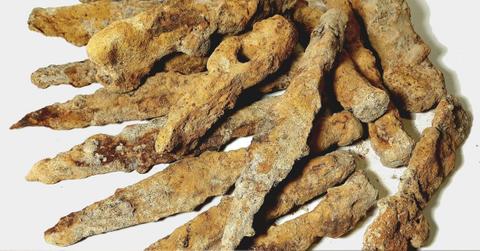Rustic Relics: Barbarian Iron Age Carpentry Tools, Weapons Discovered in Polish Forest

An array of metal weapons discovered in a Polish forest could date back to the Roman Era.
In an unexpected discovery, a collection of metal weaponry believed to date back to Ancient Rome recently was unearthed in a state forest in Poland.
The finding, disclosed by the Lublin Provincial Monuments Conservator, sheds light on a potential connection to an Iron Age community in the region.
The cache of artifacts, predominantly composed of corroded iron, includes two iron battle axes, two iron chisels, around a dozen iron spearheads and a blade ax assumed to have been utilized for carpentry purposes.
Experts speculate that these findings could be linked to the Przeworsk culture, an Iron Age group that thrived in the upper Oder and Vistula basins from the 3rd century B.C. until the 5th century A.D., when the region experienced invasions by the Huns followed by the collapse of the Roman Empire.
While the possibility of associations with Gothic cultures or the Vandals is also under consideration, further investigation is warranted.
According to reports by Newsweek, Mateusz Filipowicz, a treasure hunter, stumbled upon the trove concealed in a marshy locale. Filipowicz described the initial challenge of discerning the objects due to extensive corrosion and sediment accumulation.
Upon their recovery, the artifacts were transferred to the Stanisław Staszic Museum in Hrubieszów for preliminary analysis.
Absence of bone or pottery fragments at the site suggests it was not a burial ground but rather a location where the weapons were deposited, possibly in a now-deteriorated container, before being discarded in the swamp.
Never miss a story — sign up for the Front Page Detectives newsletter. Be on the scene the moment news breaks.
Commenting on the discovery, the museum highlighted long standing speculations about the presence of Gothic weaponry in the Hrubieszów area, noting the absence of iron objects in Gothic graves.
The artifacts are currently undergoing preservation at the museum, with plans for further examination of the swamp area in spring to gain additional insights into the historical context surrounding the findings.
Become a Front Page Detective
Sign up to receive breaking
Front Page Detectives
news and exclusive investigations.
